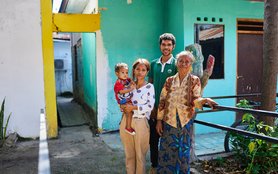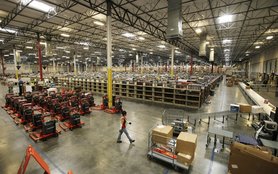NEW YORK, NY – The United Nations World Food Program (WFP) and Oxfam America, supported by the United States Agency for International Development (USAID) and Swiss Re respectively, today committed at the Clinton Global Initiative to expand their ground-breaking “R4 Rural Resilience Initiative" to help the rural poor to protect their crops and livelihoods from the impacts of climate variability and change, including drought.
This innovative public-private partnership will be expanded from Ethiopia to Senegal over the next five years. It empowers farmers and food-insecure rural households with integrated risk management tools to develop long-term resilience.
"For the 1.3 billion people living on less than a dollar a day who depend on agriculture for their livelihoods, natural disasters are a constant threat to their food security. The most vulnerable people in the world are being hit by more frequent and intense climate-related disasters. The world knows how to do this: Proven tools have broken the cycle of emergency hunger for millions, building resilience in the face of repeat disasters," said WFP Executive Director Josette Sheeran.
R4 will enable poor farmers in Senegal to strengthen their food and income security by managing risks through a four-part approach—improving natural resource management (community risk reduction), accessing microcredit ("prudent" risk taking), gaining insurance coverage (risk transfer), and increasing savings (risk reserves).
USAID has just announced a new $8 million award to WFP to support the expansion of R4 to Senegal and the global development of the initiative.
"We are pleased to help take this innovative program to the next level, scaling it up to reach thousands of farmers," said USAID Administrator Rajiv Shah. "We see this as a promising approach to tackling hunger and climate vulnerability in an integrated way that will deliver real results for rural communities."
Swiss Re is supporting the R4 initiative as the exclusive insurance sector partner and will lead the design and implementation of risk transfer solutions. These innovative solutions form part of a comprehensive risk management program that will give thousands of poor, small-holder farmers the means to manage weather vulnerability and enable the risk-taking essential to economic development. Swiss Re will contribute $1.25 million to the initiative.
"Insurance is a cornerstone of economic growth and stability, and we are proud to contribute our expertise to this project which allows the poorest farmers and their families to cope when crops are ruined by drought, flood or other climate related impacts. Through the pilot in Ethiopia, we have seen that even farmers with no monetary income can build a better future by trading labour for insurance, in ways that also help to strengthen their communities. We are pleased that the model which began with just 200 households in Ethiopia three years ago, has been successfully scaled up and will now be replicated as R4 in other countries, including Senegal, to help thousands more," said Michel Liès, Chairman Global Partnerships, Swiss Re.
R4 builds upon the highly successful growth of a multi-year pilot in Ethiopia known as the Horn of Africa Risk Transfer for Adaptation (HARITA) project, which involved a network of global and local partners including Oxfam America, Swiss Re, the Rockefeller Foundation, the Relief Society of Tigray, Dedebit Credit and Savings Institution, Nyala Insurance Company, Africa Insurance Company and the International Research Institute for Climate and Society at Columbia University. In its three of years of delivery this pilot, HARITA, has scaled up from 200 enrolled households in one village in 2009 to over 13,000 enrolled households in 43 villages in 2011.
"Expansion to Senegal will allow Oxfam to build upon our success in Ethiopia and test this model in a new country. Having insurance will make it easier for poor people to access credit on better terms, so that farmers can buy the tools and the drought-resistant seeds needed to grow bigger and better crops and poor families can protect their savings in tough times" said Raymond C. Offenheiser, President of Oxfam America.
The R4 Rural Resilience Initiative is a strategic collaboration between the World Food Programme and Oxfam America, with no co-mingling of funds. Each partner has its own sponsors: WFP is sponsored by USAID, and Oxfam America by Swiss Re.
How it works
Gebru Kahsay is a 52-year-old farmer in the Adi Ha area of Tigray in northern Ethiopia, who depends on rain to grow teff, a staple grain. In 2009, rains came late to Adi Ha, but Kahsay had a backup plan if the rain didn't cooperate: weather insurance. "According to my belief, this insurance is important to protect us from migrating in a drought in search of food," says Kahsay.
In the absence of functioning financial markets in most rural areas, poor households adopt conservative risk taking stances and cope with disasters in ways that often compromise their livelihoods resulting in long term negative consequences. To survive, households are often forced to reduce food consumption, remove children from school, or sell productive assets.
Through R4, farmers will be able to pay for their insurance premiums through labor in food-and-cash-for work programs. Their labor will contribute to community projects such as irrigation or forestry to reduce the impacts of climate change on their villages.
More prosperous farmers will pay their insurance premiums in cash. Over time, as the poorest farmers become more prosperous, they can "graduate" from the need to pay through labor, and begin paying in cash, helping to ensure the project's commercial viability and long-term success.
Over the next five years, Oxfam America and WFP plan to scale up and evaluate the R4 approach in 4 countries. In addition to continuing efforts in Ethiopia and the new work in Senegal, this will include two additional countries as the initiative progresses.


